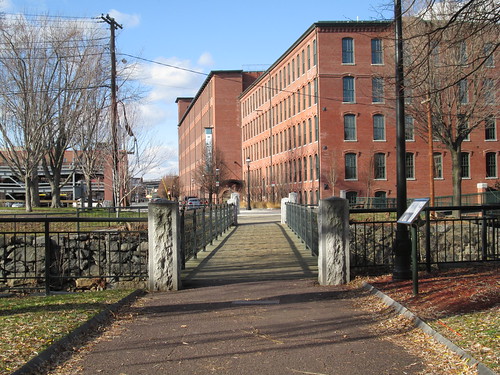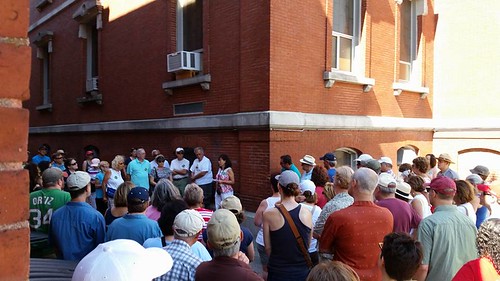Lowell Week in Review; July 17, 2016

Perkins Place apartments
Two big real estate sales were consummated this week. On Thursday, UMass Lowell took ownership of the Perkins Place apartments, and on Friday, Vision Development took ownership of the former Lowell Five Cent Savings Bank headquarters at One Merrimack Plaza (across from Lowell High School). Like most complex real estate transaction of this type, other entities were involved. Here are the details.
In the Perkins sale, One Perkins Street LLC sold to University of Massachusetts Building Authority the parcels known as 1 Perkins St for $1,250,000; 21-39 Perkins St for $40,350,000; and 65 Perkins St for $15,150,000. Perkins Ames LLC sold 40 Perkins St to UMass Building Authority for $4,750,000. That’s a total sales price of $61,500,000.
In the other sale, Lowell Five Cent Savings Bank and Merrimack Properties Inc. sold to Mack Canal LLC the parcel known as One Merrimack Plaza for $3,275,000. According to records from the Secretary of State’s website, the new owner, Mack Canal LLC, is controlled by the owner of Vision Development. This gentleman must be anxious to get the project started because last I heard, some of his authorizations from city of Lowell boards had been appealed by the owner of the abutting River Place Towers apartment building. He also must be confident he will prevail in the appeal which is pending in Superior Court.
Vision plans to build a large apartment building on the site that is intended for college students. It is sometimes called a privately-owned dorm. Because it will be privately owned (as opposed to owned by a governmental entity or a non-profit), it will pay real property taxes in the normal manner. Not so the Perkins Apartments since UMass Lowell is part of state government and Massachusetts does not pay to local government property taxes on buildings it owns in the local community.
Two things about the Perkins sale were problematic. First is the inevitable displacement of current residents. The tenants who shared their plight at a city council meeting when news of this sale first broke were all well-spoken professionals who have embraced living in downtown Lowell. They were emblematic of our aspirations for downtown as a mixed use neighborhood to replace the retail and office uses that moved to the suburbs long ago. With comparable rental housing in the city relatively scarce, these people and their neighbors will likely move elsewhere which will be a loss to Lowell.
The second problem is that, given the value of the real estate involved, suddenly moving it from property tax paying status to exempt from property tax status, blows a significant hole in the city’s tax revenue projections. It turns out this problem has been tempered in the current fiscal year (as I understand it) by UMass Lowell agreeing to pay the full property taxes for this year (even though it is not legally obligated to do so). To city councilors, whose gazes are always set on the next municipal election, taking away $300,000 in revenue in future fiscal years leaves them with the politically unpalatable choice of raising taxes on everyone else or cutting services so as to live with the reduced amount of revenue. (A cynic might say that because increased costs are built into every municipal budget, the council will have to raise taxes and cut services regardless of this sale, but now they can blame it on UMass Lowell and dodge the political heat themselves).
Still, if Lowell aspires to be a “college town” – that is, a community known for its educational institutions and a community that benefits economically from those institutions – we have to see UMass Lowell as something other than a giant eraser of city property tax revenue. To do otherwise is incredibly short-sighted. Perhaps that’s a consequence of elected leaders thinking in two year cycles rather than over the longer term.
I’ve argued repeatedly that UMass Lowell growing into the area bounded by the Northern Canal and the Merrimack River – from the Howe Bridge all the way to Boott Mills – is good for the city in the long term notwithstanding short term problems posed by things like the Perkins sale. That area was once home to Little Canada and the Merrimack Mills, but both were demolished in 1960s Urban Renewal programs with the promise that the existing structures would be replaced by “new industry,” whatever that was supposed to be. Well new industry never came, and that substantial strip of land hasn’t been used to its full potential since then. Promoting University expansion into that area draws the school closer to downtown Lowell with all its businesses and entertainment venues that would greatly benefit from more University-affiliated customers. University expansion into the area would also strengthen the Acre neighborhood that borders it on the other side of the Northern Canal and Fr. Morissette Blvd. And University expansion into that area might divert expansion away from Fletcher Street, Pawtucket Street, Riverside Street, University Avenue and all the other established residential neighborhoods that now border the college. Our goal should be to constantly engage the University in discussions about its future, do all that we can to ensure that the University’s expansion plans and the city’s long term strategic plans are in sync, negotiate the differences, and then celebrate all the benefits that UMass Lowell brings to the city.
Regarding property tax payments by nonprofits, the Sun reported this week that an amendment filed by Representative Dave Nangle that would require nonprofits that became the owners of real estate to continue paying property taxes for four years on a tapering scale, had failed to be accepted by the state senate. This is not a standalone bill; instead it’s an amendment to some other bill that passed the House, however, the Nangle amendment was not included in the senate version of the same bill (it is unclear to me what the underlying bill is about – probably some omnibus revenue or government services matter; it is not the state budget which has already passed both houses). If the amendment had made it into both the house and the senate versions, it would be “in the bill” without any further action. Now, the two versions of the bill will be taken up by a conference committee which consists of a few key representatives and senators who negotiate over the differences between the two bills. Whatever version the conference committee, which works in secret, arrives at, will be the final version that both houses vote on. If Nangle’s amendment is kept in by the conference committee, it will probably become law. If it is removed from the final version, then it won’t become law through this vehicle.
In a related matter, the website of the state legislature shows no new action on the two identical bills that the council voted to endorse at its last meeting per a motion by Rodney Elliott. These two bills, House 2584, and Senate 1451, call for nonprofits to pay 25% of the property taxes that would be due if the same property were owned by a tax paying entity.

Lowell Walks – outside Smith Baker Center
The subject of property taxes came up on yesterday’s Lowell Walk of upper Merrimack Street which was led by Yun-Ju Choi, the executive director of the Coalition for a Better Acre. Yun-Ju did a terrific job showing the 88 people who attended many of the renovated buildings within the Salem-Merrimack-Moody Street corridor. If, like me, you spent any time in that area during the late 1980s and remember how crime-ridden and run-down it was, you would be amazed at how well it looks today. Among our stops yesterday was the former St. Joseph’s High School which is now CBA owned and operated affordable housing. Yun-Ju pointed out that the “affordable” label has more to do with qualifying the project for federal tax credits which is how many CBA projects are financed. (The federal government provides tax credits for constructing affordable housing or for preserving historic structures, then the developer sells the tax credits to investors who are looking for credits that will reduce their tax liability; and the developer uses the cash payment for the credit to pay the construction costs – without programs like these, few of the major projects in Lowell over the past decade would have occurred). Nevertheless, the rent, which is paid entirely by the tenants, is still substantial. For instance, a two bedroom apartment in St. Joseph’s (now called the Acre High School) is $1100 a month; a three bedroom is $1250. The husband, wife, and Middlesex Community College-attending daughter who live in the apartment we visited, all work – the parents fulltime. Alluding to all the recent news about nonprofits and property taxes, Yun-Ju also explained that CBA pays the full property tax rate on all their buildings. Last year, CBA paid the city of Lowell $650,000 in property taxes.
Speaking of Lowell Walks, next week’s should be a popular one. It is “Fires in Downtown Lowell” and will be led by Captain Jason Strunk of the Lowell Fire Department. The tour begins at Lowell National Park Visitor Center, 246 Market Street, at 10 am on Saturday, July 23. It is free and requires no advance registration. Just show up ready to walk.
Later that same day (2 pm to 330 pm on Saturday, July 23) some people are gathering at Kittredge Park at the corner of Andover and Nesmith Streets to enjoy the park with music, food, and talk, but also to draw attention to the Commonwealth’s plans to widen Nesmith Street adjacent to the park at the expense of the trees that now line the road and to the walkability and bikeability of that stretch of road. This gathering will be especially timely, because a public hearing on this project will be held Mass Highway on Thursday, July 28, 2016 at 7 pm at the Pollard Memorial Library’s community room. I’ll write more about the Kittredge Park gathering later in the week as more details become available.